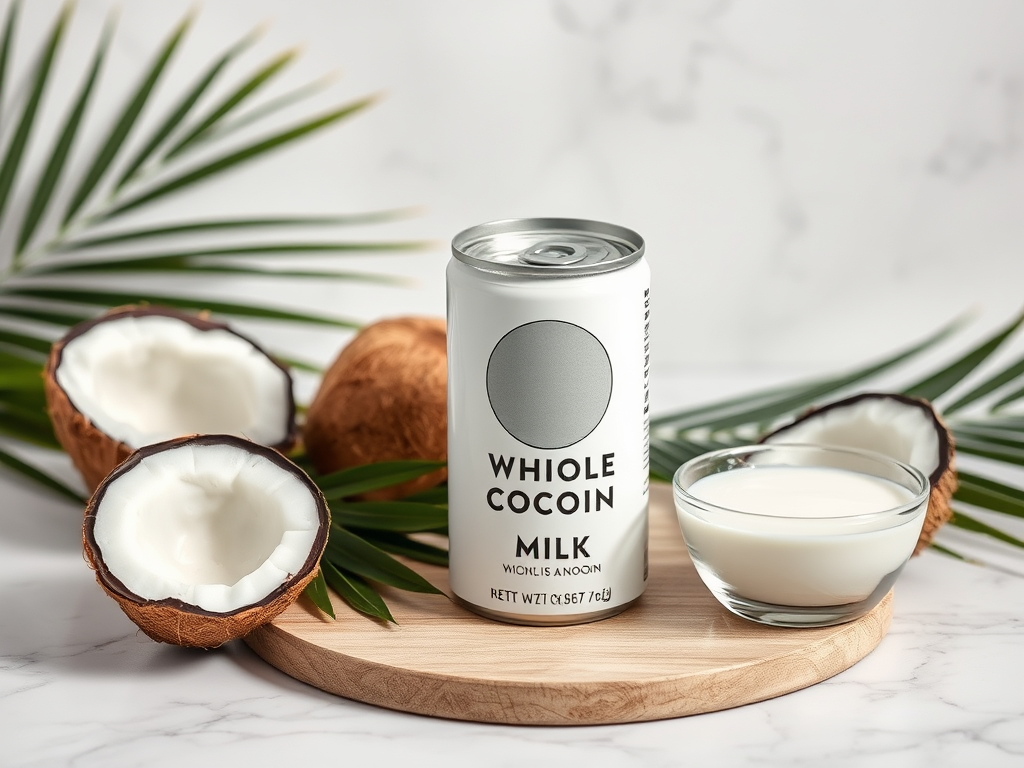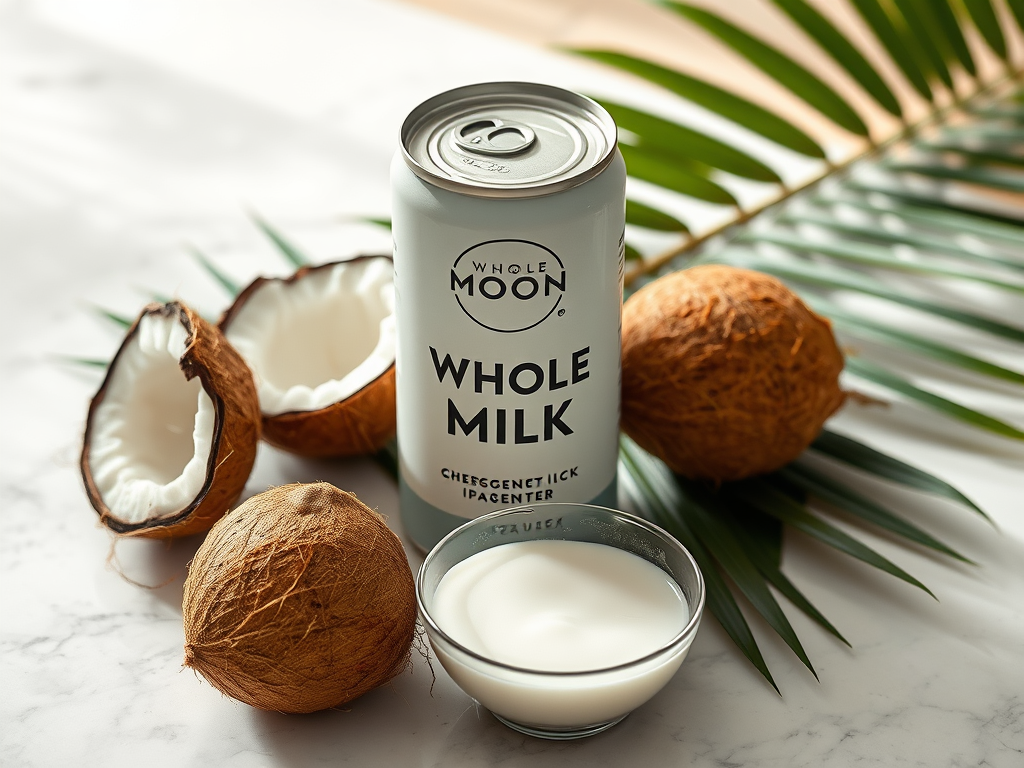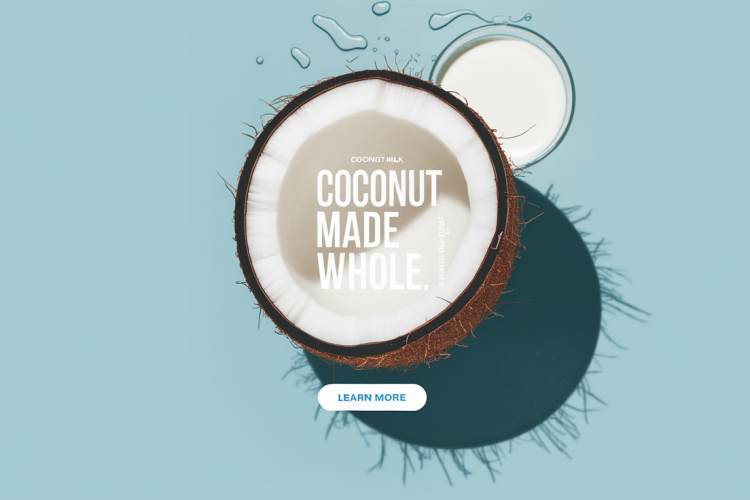The plant-based milk industry welcomes a groundbreaking innovation as Whole Moon introduces the nation’s first coconut milk made exclusively from whole coconut meat, without added creams or oils. This revolutionary product expansion comes as the plant-based dairy market expands dramatically across America. Whole Moon’s unique coconut milk will be available nationwide at Sprouts starting March 2025, adding to its existing retail presence at ShopRite, Fairway, and Central Markets. “We’re thrilled to offer consumers the first coconut milk made from whole coconut meat—no creams, no oils, just pure, whole ingredients,” states Susan Knight, president of Whole Moon.
Pure Ingredients Revolution: The Whole Coconut Advantage
Whole Moon’s approach to coconut milk stands out in the crowded alternative milk market with its revolutionary whole-food processing method. Unlike conventional coconut milks that often rely on extracted coconut cream or added oils for texture, Whole Moon uses the entire coconut meat in its natural state. This distinction creates a product that maintains the coconut’s original nutritional profile without diluting it with fillers or additives.
The company’s commitment to purity extends beyond just coconut. Their proprietary process incorporates whole-roasted plant ingredients including almonds, oats, pistachios, and soybeans alongside the coconut meat. This thoughtful combination delivers a milk alternative that tastes remarkably rich while maintaining a nutritional edge over competitors.
What caught my attention when sampling this product was the authentic coconut flavor that doesn’t overwhelm but instead offers a natural sweetness. The texture strikes a perfect balance – creamy enough for coffee but not so thick that it can’t be enjoyed as a beverage. For consumers frustrated by watery plant milks or those too heavy with additives, this offers a refreshing middle ground.
The benefit of using whole ingredients extends to sustainability as well. By utilizing the entire coconut rather than just extracting parts, Whole Moon reduces waste in production and honors the full value of each ingredient. This approach aligns with growing consumer demand for products that consider environmental impact alongside nutritional benefits.

Nutritional Powerhouse: Benefits Beyond Basic Coconut Milk
The nutritional profile of Whole Moon’s coconut milk makes it stand out in the increasingly competitive plant milk category. By preserving the complete nutritional integrity of whole coconut meat, this product delivers protein, fiber, and essential nutrients often missing from traditional coconut milk options. Each serving contains a complete protein source featuring all nine essential amino acids – a rare find in coconut-based products.
Conventional coconut milks typically contain 0-1 grams of protein per serving, while Whole Moon’s version offers substantially more thanks to its whole ingredient blend. The fiber content also surpasses standard coconut milk products, contributing to improved digestive health and satiety when consumed. For those tracking macros, this makes it a more nutritionally balanced choice without sacrificing taste or texture.
Another significant advantage is the absence of added oils. Many competing products use oils to achieve a creamy consistency, but Whole Moon relies solely on the natural fats present in their whole food ingredients. This results in a more balanced fatty acid profile and reduces processing steps. The milk is also notably low in sugar, making it appropriate for various dietary preferences.
With its impressive certification lineup – kosher, dairy-free, gluten-free, vegan, and Non-GMO Project Verified – Whole Moon addresses virtually every common dietary concern. These certifications reflect the brand’s attention to quality and inclusivity in product development, making it accessible to consumers with various dietary restrictions and preferences.
Versatility In The Kitchen: Culinary Applications
The culinary versatility of Whole Moon’s coconut milk extends far beyond the breakfast table. Its rich consistency and balanced flavor profile make it ideal for both sweet and savory applications in the kitchen. When testing it in various vegan dessert recipes, I found it performed exceptionally well without separating or curdling under heat.
For morning routines, this coconut milk creates a silky foam for coffee that rivals dairy alternatives. It doesn’t overwhelm coffee flavors but instead complements them with subtle coconut notes. In smoothies, it adds creaminess without the watery dilution that occurs with some plant milks or the overwhelming richness of canned coconut milk.
Cooking applications reveal even more benefits. The milk maintains stability in soups and curries, allowing for reduced cooking times while still achieving velvety textures. Its natural sweetness works particularly well in dishes that need balance against spicy or acidic components. Bakers will appreciate how it can be substituted 1:1 for dairy milk in most recipes, with its whole-food composition helping maintain proper structure in baked goods.
For those exploring vegan holiday desserts, this coconut milk makes an excellent base for puddings, ice creams, and custards. The natural protein content improves freezing properties for frozen desserts, resulting in a smoother texture with less crystallization. Consider trying it in homemade coconut-based ice cream or as a luxurious addition to chocolate mousse for impressive results.
Product Lineup and Value Proposition
The addition of coconut milk expands Whole Moon’s impressive lineup that already includes Almond, Oat, and Pistachio varieties. Each product in the range maintains the company’s commitment to whole-food, minimal processing standards while offering distinct flavor profiles. The coconut variety complements the existing options while introducing unique culinary possibilities.
Priced at $5.79 for a generous 42oz bottle, the coconut milk positions itself as a premium but accessible option. Compared to other specialty plant milks that often retail between $4.99-7.99 for smaller volumes, Whole Moon offers compelling value, especially considering its unique whole-ingredient approach. The larger size makes it practical for families or frequent users who tire of constantly replenishing smaller cartons.
For consumers already exploring the growing vegan dessert market, this product offers a versatile staple ingredient worth the investment. The bottle’s design includes convenient pouring features and resealable packaging that maintains freshness for up to ten days after opening when refrigerated. This practicality adds to the overall value proposition for busy households.
When compared against traditional dairy milk pricing, Whole Moon certainly represents a premium choice. However, for those seeking plant-based alternatives with superior nutrition and culinary performance, the cost difference becomes more justifiable. The product’s multi-purpose nature – working equally well as a beverage and cooking ingredient – further enhances its value proposition for conscientious consumers.
Retail Availability and Future Expansion
Finding Whole Moon products becomes easier with their nationwide rollout at Sprouts beginning March 2025. Current availability includes established partnerships with regional favorites like ShopRite, Fairway, Central Markets, Key Foods, and C-Town. The strategic retail expansion places Whole Moon products in accessible locations across various geographic markets, reflecting the brand’s growing national presence.
Planned distribution will soon extend to Fred Meyer, Mother’s Market, and QFC, increasing availability particularly in western states. This calculated expansion demonstrates Whole Moon’s response to increasing consumer demand for premium plant-based options beyond traditional retail channels. The company’s store locator at https://wholemoon.com/pages/store-locator offers a convenient way to find the nearest retailer carrying their products.
The timing of this expansion coincides with peak interest in dairy alternatives and aligns with seasonal cooking patterns as consumers seek lighter options heading into warmer months. The distribution strategy focuses on retailers known for quality food offerings and health-conscious consumers, rather than pursuing mass-market penetration at the expense of brand positioning.
For those unable to find Whole Moon locally, the company hints at developing direct-to-consumer options in the near future. This multi-channel approach reflects modern shopping preferences while ensuring product freshness through temperature-controlled supply chains. The brand’s presence in both specialty health stores and mainstream grocers demonstrates its appeal to a broad consumer base seeking better plant-based options.

The Brand Behind the Innovation
Whole Moon operates as a forward-thinking subsidiary of parent company WhiteMug, headquartered in Albany, N.Y. Under the leadership of President Susan Knight, the company has built its reputation on challenging conventional approaches to plant-based foods. Their development philosophy centers on minimal processing and transparency, addressing growing consumer concerns about highly processed plant foods.
The brand’s origin story reflects a genuine commitment to improving plant-based options. Founded after its creators became frustrated with existing alternatives that relied heavily on additives and extracts rather than whole foods, Whole Moon set out to create products they themselves would want to consume daily. This authentic problem-solving approach resonates with consumers increasingly skeptical of corporate food development.
Sustainability forms a core component of Whole Moon’s mission. Their ingredient sourcing prioritizes responsibly grown almonds and other plant components with attention to water usage and farming practices. The company maintains certifications beyond just product quality, extending to their environmental and social impact throughout the supply chain.
Looking forward, Whole Moon positions itself as an innovation leader rather than a trend follower. Their R&D department continues exploring additional whole-food plant milk varieties and complementary products. The company’s commitment to clean ingredient panels and minimally processed foods signals a meaningful contribution to evolving how consumers think about and enjoy plant-based alternatives in their daily lives.



